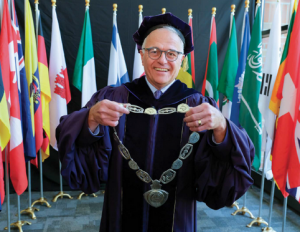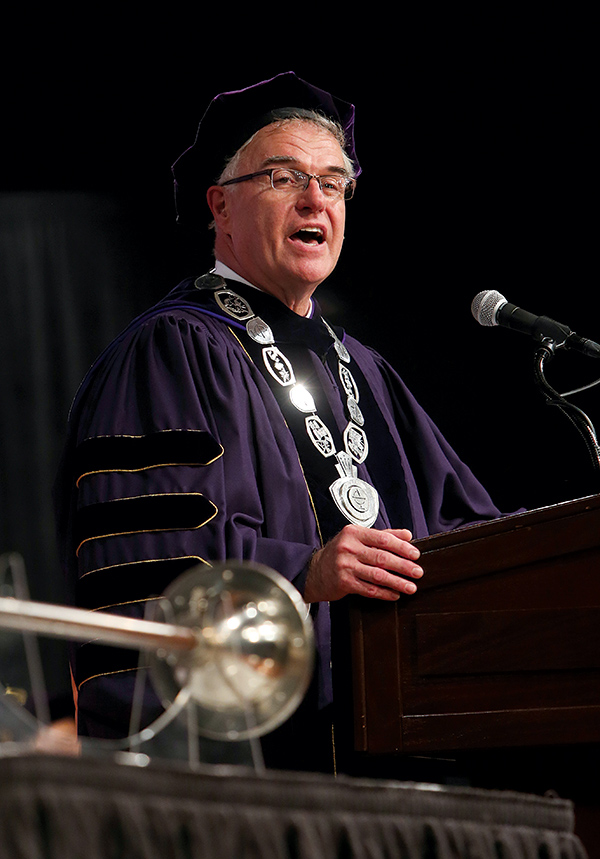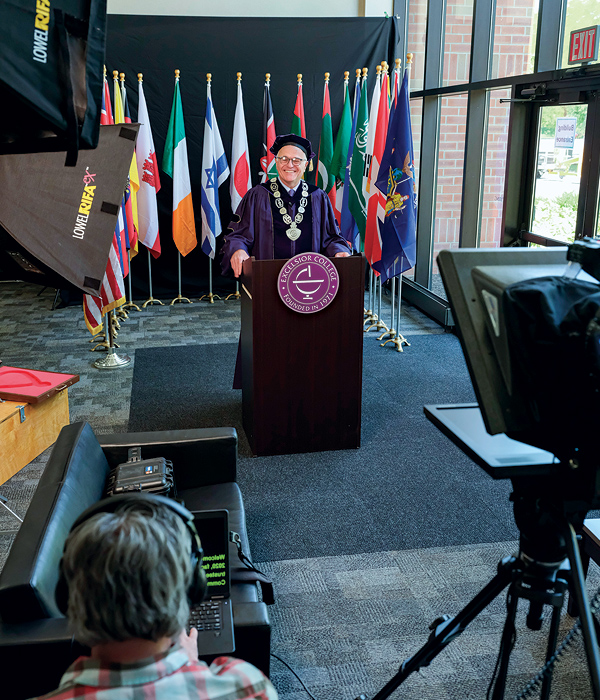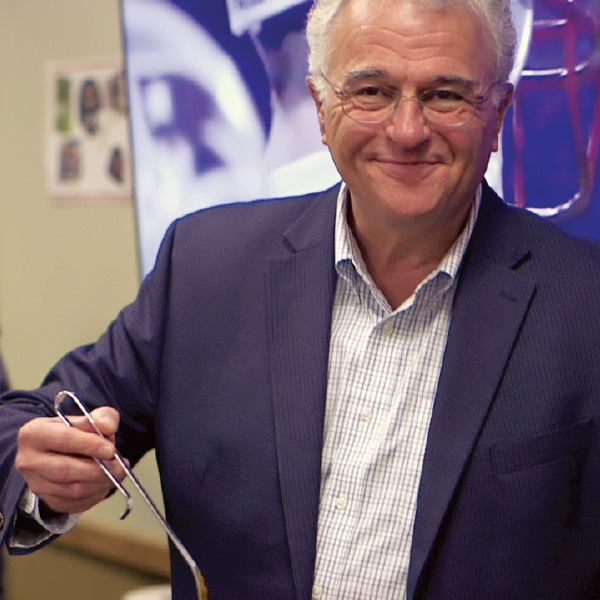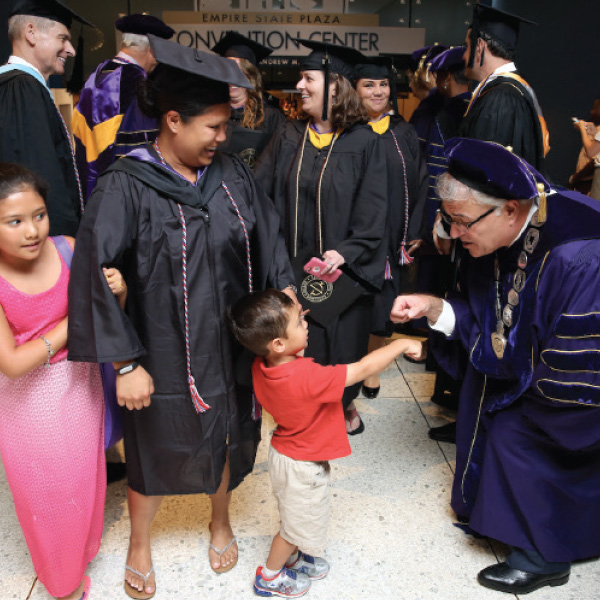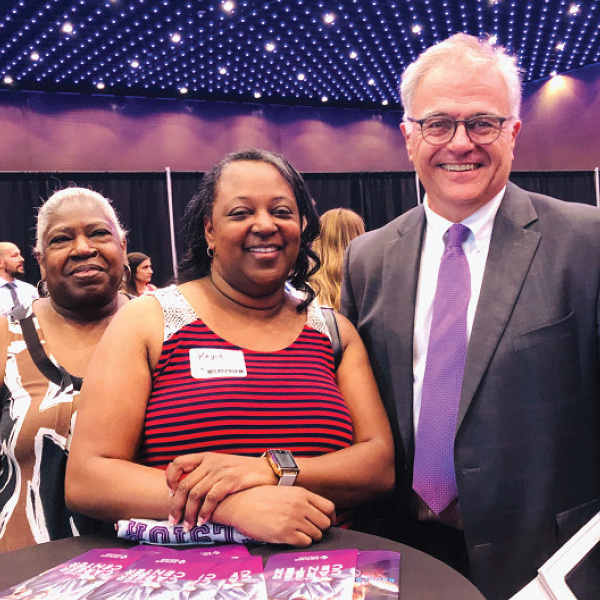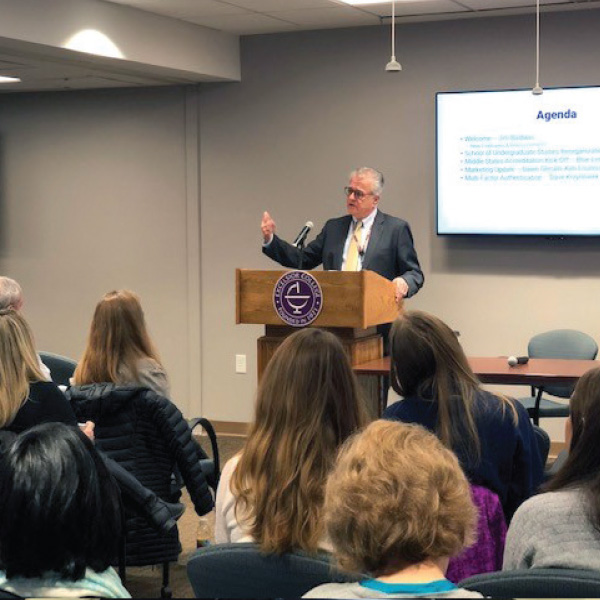James N. Baldwin’s tenure as president of Excelsior College transforms the institution with his focus on expanding educational opportunity, improving the student experience, telling the Excelsior story, and ensuring long-term stability
“If Excelsior College didn’t exist, someone would have to create it.”
That is a statement James N. Baldwin, president of Excelsior College, has said many times. It captures in a few words both his commitment to the College’s mission to provide educational opportunities for adult learners and his belief that Excelsior, a degree-completion college, serves a unique — and essential — purpose in higher education.
Throughout his leadership of Excelsior, Baldwin has worked to preserve that mission and shore up the College to serve adult learners well into the future. His tenure as president ends July 31, 2020, after serving in the position since May 2016.
Baldwin has spent most of his career working in education, first in public schools and then as chief of staff and acting deputy commissioner for higher education in the New York State Education Department. He was also the executive deputy secretary of state for New York from 1983 to 1995. Before joining Excelsior, he served as district superintendent for Questar III Board of Cooperative Educational Services. In that role, he was a regional representative of New York’s commissioner of education and the CEO of the educational cooperative that helps school districts operate more efficiently and effectively by pooling their resources and sharing costs.
He has a profound understanding of the impact of ensuring access to education and then building on that access to ensure competency and mastery of the subject matter so that learners can accomplish their goals. Helping adults to fully realize their potential is something of great interest to him, from the professional as well as from the personal point of view. Education, he says, is the source of his own personal success.
“Everything I have been able to do, to accomplish in my career, to provide for my family, and to contribute to my community has been because I was able to get an education,” says Baldwin.
James N. Baldwin was officially installed as the third president of Excelsior College during Commencement in 2017. In his inaugural marks, Baldwin stated his vision for Excelsior College. “… I promise you this: We will be relentless in providing access, affordability, and an exceptional student experience. We will reclaim our place as a leader and innovator in higher education based on Excelsior’s mission and Excelsior’s values. And we will do it all with good and faithful stewardship of this institution and its mission, one day handing it off to our successors stronger and even better.”
Photo: Kris Qua
Originally from Albany, New York, Baldwin grew up in an ethnic, immigrant neighborhood, and his worldview was shaped by the values instilled in him from his parents, extended family, and Roman Catholic elementary school education. He was a first-generation college student and graduated from Union College, in nearby Schenectady, New York, with a Bachelor of Arts in Political Science. He went on to earn a Juris Doctor from Albany Law School and a Doctor of Education in Organization and Leadership from Teachers College, Columbia University.
Baldwin’s fundamental belief in the transformative power of education has shaped Excelsior College, where his leadership espouses an obligation to expand educational opportunity and to support learners at each step of their educational journeys.
“Education fused my intellectual development with my emotional, personal, and spiritual experiences. It broadened my perspective, opening my eyes to the larger world,” he said during his remarks at his inauguration. “Over time, I saw how transformative education can be, discovering the connection between the opportunity to be educated, the pursuit of learning by the individual, and how an educated society advances social and economic justice and the human condition.”
Baldwin’s fundamental belief in the transformative power of education has shaped Excelsior College, where his leadership espouses an obligation to expand educational opportunity and to support learners at each step of their educational journeys. His tenure also introduced the concept of servant leadership to the College. In this leadership model, the leader has a service-first mindset and actively seeks to develop and align an individual and a collective sense of purpose with the mission and values of the organization.
Baldwin uses the term “colleagues” purposely because he views all of those employed by the College as his peers, his colleagues. He has encouraged them to activate their own purposes, as well as their creative and innovative dispositions, in their work at the College. This translates to leadership coming from employees throughout the organization to address opportunities and challenges.
“The work gets done where we meet our students,” says Baldwin. “It’s another reason why servant leadership is so important. I’m not the one on the phone with our students every day. I’m not relating to them in a course. I don’t necessarily have the answers; those closest to our students probably do. I work with them to articulate, clarify, and reinforce our organization’s mission and values. And I work to make sure they have what they need to serve our students.”
Sustaining the Institution
From the start of his tenure, Baldwin recognized that, in an ever-changing global economy, pathways to degree completion for adult learners and the historically underserved are needed more than ever. He believes Excelsior serves a public purpose in meeting this need. He noted that since its inception, the College has served as a beacon of hope for those left behind by traditional educational institutions. He also recognized that for Excelsior to endure and fulfill its promise, it needs to focus on its core mission and execute on its strategies.
The year he became president, the College faced a serious financial crisis, and Baldwin made a commitment to do what was required to create a foundation on which the College could build its future. Consulting with and retaining a variety of experts, he led the College through difficult, often painful business decisions.
“Jim stepped into the presidential role at a time of great uncertainty, and with that came great responsibility,” says alumnus Jerry L. Neff, chair of the Excelsior College Board of Trustees from 2014 to 2017. “He displayed the type of values-based leadership we needed to carry the College forward, and the board of trustees and the College community had the utmost confidence in his ability to do so. Jim was the right person at the right time to take the reins as president and CEO of our College.”
That challenging time resulted in renewed and strengthened board governance, creation of the Office of Risk Management with an internal auditor reporting to the board of trustees, the consolidation of operational units under the direction of a chief operating officer, and key performance indicators (KPIs) for each activity of the College. The budget development and management process was completely transformed with the implementation of training for budget managers, strengthened internal controls, increased accountability, and improved efficiency across the College.
While efforts were underway to return the College to financial stability, resources were redeployed to areas that would strengthen the College for the long term. A new strategic plan focused on three areas: (1) rigorous, engaging academics and an improved student experience, (2) technology investments, and (3) marketing initiatives to enable the College to “tell its story.” Progress in each of these areas was underpinned by a strengthened financial position.
The strategic plan was developed through an inclusive process that involved people at all levels of the institution and the board of trustees. Updated annually, it serves as a roadmap for the College and generates alignment and organization-wide support for strategic initiatives. With focus on the execution of specific objectives and regular reporting on KPIs, there is steady progress on initiatives that move the College forward. As it did last year, the College will conclude this fiscal year, ending June 30, 2020, with a significant surplus that will be invested in its strategic initiatives going forward.
In addition to the financial turnaround, Baldwin’s tenure has seen major accomplishments in the areas of academic programs, student experience, technology, and marketing and business development.
Academic Programs
Excelsior has refocused on its core mission of providing learners with opportunities for degree completion. The restructuring of schools and student services in 2018 reduced the number of schools from five to three and phased out less popular degree programs and concentrations, putting the emphasis on in-demand programs that correspond with employment opportunities as well as with student needs and interests.
To address readiness for academic success, the College now requires completion of a Cornerstone course in its undergraduate programs. The first course of each degree program, the Cornerstone ensures that students have a “smart start” to their Excelsior experience and lays the foundation for their success.
Baldwin worked with Excelsior’s School of Nursing to focus its nationally recognized associate degree program to certain geographic areas, invest in remote “on-the-ground” capacity to better support and engage students in clinical settings, and to make better use of technology through virtual clinical simulation in courses.
To dramatically improve student engagement and the academic experience, the College retained Ellucian, a technology company that provides software and services to the higher education sector, to work with its faculty and academic leadership to transform its degree programs and courses. The transition to the Canvas Learning Management Platform, which offers far greater opportunities to develop and deliver engaging content, was completed.
Baldwin talks about the potential for an “academic ecosystem” at the College, where transfer credits, credit for prior learning, exam-based credit, and credit from online courses are combined as part of individualized learning plans to help students earn their degrees.
Student Experience
Baldwin insists College employees put students first. Progress toward a more student- and academic-centered culture has been significant. By viewing the student experience as a continuum from inquiry to degree completion to alumni status, the College focuses on expanding support for students at every step of their educational journeys. Baldwin sees more work to be done in this area.
“We’ve made progress, conversions have improved, transcript analyses are more responsive and complete in several days instead of weeks, and financial aid is packaged once per year so students can smoothly register for courses in the College’s six terms,” says Baldwin. “But we must adjust our advising and counseling model and make better use of available technology in improving the student experience and our capacity to intervene and offer help where needed. We need to maximize the value that our colleagues bring to their interactions with students by using technology to free them for more person-to-person interaction.” Improved technology will enable students to self-serve where they are able to and seek support from their academic advisors when needed.
A commitment to student service also led to an emphasis on student advocacy and the creation of offices to support students with disabilities and ensure fundamental due process to students. In addition, the College adopted the CARES credo (each employee is compassionate, agile, respectful, and committed to excellence and service) that guides interaction with students. All student-facing services are led by an associate provost, who is responsible for the delivery of a high-quality and responsive student experience.
Technology
With an initial focus on addressing millions of dollars in deferred investments in technology and reinventing the College’s website, the College now has a technology plan that requires investments in technology as an ongoing priority. Since Excelsior is an online institution, Baldwin sees the technology infrastructure as the College’s campus. “We don’t have a campus in a physical sense, and we don’t need one,” he says. “Our technology infrastructure is our campus, and it must be robust and constantly improving.”
New systems have improved the operations of the College. These include a new financial information system and a human resources management system, changes in business practices and functions, and the centralized availability of data in a new data warehouse. In addition, regular improvements have been made to other information systems integral to the online learning experience. Achieving the goal of an enterprise resource planning (ERP) system, the centralized system that integrates enterprise functions, has been a challenge and remains a work-in-progress. The process of working toward the creation of an ERP has created opportunities for the College to question its policies and business practices, which is viewed as a positive step toward a successful future implementation.
Marketing and Business Development
Baldwin often refers to Excelsior as “the best kept secret in higher education” as he relates the need to tell the Excelsior story and the stories of student success to more audiences.
Marketing has been a strategic area of focus since 2017, and efforts have centered on building the Excelsior College brand and the brand story. The College researched, developed, and launched a brand campaign with the tagline “Life Happens. Keep Learning.” Messaging has focused on the College’s generous credit acceptance and ability to evaluate and award credit for military and workplace training. The College’s redesigned website is constructed to target prospective students. A cost and time-to-degree-completion estimator shows them how starting with more credits can shorten the time to earning a degree and gives them an idea of what expenses will be. A robust content strategy and public relations efforts promote College activities and the achievements of students and alumni.
Related to building the brand is increasing inquiries and enrollments. In addition to traditional routes to admissions, Excelsior has partnerships with employers, associations, and other educational institutions to reach more students. Partnership students save on tuition and the overall cost of earning a degree, and this is one way the College meets its mission and increases the number of working adults with a college degree. New partnerships, such as with educational systems in Kentucky and Texas as well as with ReUp Education, which encourages people who have some college but no degree to re-enroll and provides them with coaching and mentorship, help adults earn the degrees they need for career advancement.
Leading Through Change
Through disruption, challenges, and successes, Baldwin has been a motivating force for employees to believe in the mission of Excelsior College and continue to put students first. He meets challenges directly and with steadfast calm, a quality held in esteem by many employees. He prefers to work with others to learn about issues and then develop the most promising solutions. He insists on an interdisciplinary approach, and his tenure has challenged the College to improve collaboration among all areas of the institution, to break down silos, and to execute on decisions. “You can have great ideas, beautiful plans, and dreams. You can chase shiny objects forever, but if you don’t execute and implement, you have nothing,” he says.
Baldwin sees his role as asking the right questions to stimulate thinking and discussion. He wants data-based decisions, and the College has created a data warehouse to facilitate that. He also likes to hear from experts from within and outside the institution. This model regularly comes into play, as evidenced more recently by a task force formed in response to the COVID-19 pandemic. Consisting of representatives from each area of the institution, the task force met regularly to address concerns about employee health and safety, maintaining business continuity and the student experience, and working to transition operations from on-site to remote locations.
In June 2020, James N. Baldwin participates in the recording of remarks for Excelsior College’s first-ever virtual Commencement celebration. The celebration moved online due to the COVID-19 pandemic.
Photo: Mike Hemberger
While the College learns about its capacity to support remote work, Baldwin foresees changes in how people view online learning. He projects that many current high school students will ultimately consider online learning as a first option for college. “That’s why investments in technology, marketing, the quality of what we’re offering, and better student engagement are so critical,” he says. “The students of today and tomorrow are digital natives. They have much higher expectations for what their digital experience ought to be. We must deliver on that expectation.”
Baldwin looks to the future of the institution he righted while reflecting on the opportunities that remain. He describes his tenure as “eventful, challenging, and a privilege” and acknowledges he harbors a few regrets about his time with the College. “We’ve made progress on equity and inclusion but have not succeeded in creating a more diverse institution,” he says. “I regret financial conditions that required us to part with some valued and talented colleagues, and I had hoped we would achieve greater implementation of systems to more rapidly improve student services.”
Just the third president in the institution’s 49-year history, Baldwin came to the College during a unique time. “Jim was faced with challenges that, with the help of his team, he turned into opportunities and set the College on a path of transformation,” says Helen Benjamin, chair of the Excelsior College Board of Trustees since January 2018. “I could not be more pleased with the service Jim Baldwin has rendered on behalf of the College during his tenure.”
Although no one knows exactly how the future of higher education will unfold, change is certain. Baldwin, from his view, has left the next president of Excelsior College with a solid foundation on which to build the future and a team of capable leaders and colleagues committed to working with his successor. “Our leadership team is aligned and highly capable,” says Baldwin. “Our focus on financial stability and strategic priorities is manifest in the progress we’ve made. And you will not find a place more committed to its mission.”
Excelsior College, an institution transformed, welcomes its next president well-positioned to fulfill its purpose.
Gratitude
For Thanksgiving 2019, President Baldwin recorded a message on gratitude that was shared on Excelsior’s Facebook page. His words continue to resonate, regardless of the season.
“… Gratitude reminds us of how fortunate we really are. And when things do go wrong, we can find solace, hope, and optimism in the gratitude that prompts us to reflect on what is good and right about our lives, and to be grateful for what we had … and lost, to learn from setbacks — and to identify the opportunities that adversity presents, to think about how we’ll do better the next time.
When you start or end each day with thoughts of gratitude … it can be transformative.
… I urge you to take a little time to reflect on the power of gratitude in your own life. Finally, let me express my deepest gratitude for all of you in the Excelsior College Community — our students, alumni, faculty, staff, and board of trustees — all of whom contribute to the richness of our work and the realization of our mission.”
James N. Baldwin, with his family in the last photo, has shown dedication to students and graduates as well as to employees, as evidenced by his involvement in various College activities.
